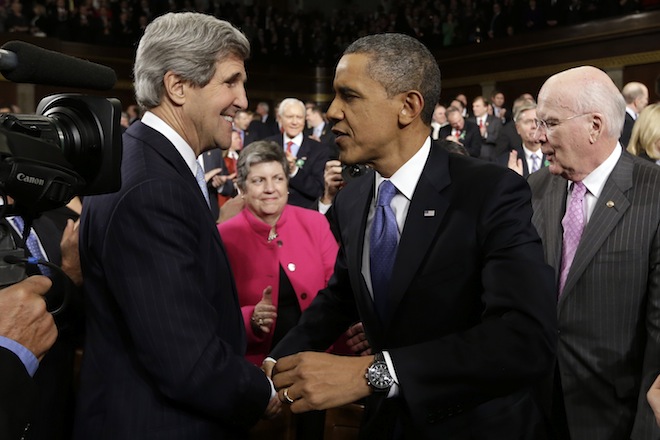Senate Democrats came close to blowing up President Barack Obama’s nuclear deal with Iran by toying with a new sanctions bill that negotiators cautioned would poison talks.
But in recent days it has become clear that they’re going to hold off, after aggressive lobbying from the White House, as diplomatic negotiators’ attempt to turn an interim six-month deal struck last November into something more permanent. The goal is to get Iran to surrender its nuclear weapons capabilities in exchange for relief from a swath of economically devastating sanctions.
“We’ve maintained for some time that as long as negotiations were taking place and Iran was fulfilling its end of the bargain, the sanctions bill would not come to the floor,” said a senior Democratic Senate aide, who wasn’t authorized to speak about the issue on the record.
The aide praised Obama and Secretary of State John Kerry for the “remarkable diplomatic feat” of convincing Iran to halt critical components of its nuclear program. “It would be foolish to put that in jeopardy by rushing this bill to the floor,” said the aide.
Legislation to beef up sanctions on Iran, authored by Senate Foreign Relations Chair Bob Menendez (D-NJ), has a whopping 58 additional sponsors, 15 of which are Democrats. Criticism of the interim deal from Israeli President Benjamin Netanyahu and AIPAC, the pro-Israel lobbying group, boosted the bill. But in the last three weeks, numerous Democrats have backed away and Senate Majority Leader Harry Reid (D-NV) has said he’ll wait to see how negotiations play out before considering the sanctions bill.
Obama, Kerry and their top aides pulled Democrats back from the brink by making their opposition to any sort of new sanctions bill clear in a series of public remarks and private face-to-face meetings with top senators. They’ve warned that bringing up a sanctions bill amid talks would empower the hard-liners in Iran, making it politically untenable for President Hassan Rouhani to cut a long-term deal. They’ve conveyed their strong belief that pushing sanctions legislation at this pivotal moment would only increase the chances of a war, according to sources familiar with the matter.
A turning point came on Jan. 12, when Obama announced that the interim deal with Iran was moving forward as planned and fired a shot across the bow to his critics: “Imposing additional sanctions now will only risk derailing our efforts to resolve this issue peacefully, and I will veto any legislation enacting new sanctions during the negotiation.” That’s when the momentum began to fade. Sens. Patty Murray (D-WA) and Elizabeth Warren (D-MA), among others, soon declared their opposition to a sanctions bill as the diplomatic process plays out. Co-sponsoring Democratic Sens. Kirsten Gillibrand (NY), Chris Coons (DE), Michael Bennett (CO) and Joe Manchin (WA) also gradually backed off the bill.
“As of Jan. 20, the nuclear deal started moving forward and Iran’s nuclear program was rolled back in some key areas,” Marie Harf, a spokeswoman for the State Department, told TPM. “So for a lot of folks on the Hill, the feeling was that we’re seeing tangible progress and they didn’t want to do anything to disrupt or roll back that progress. That’s a powerful message, and it became more real for them.”
Not everyone is convinced, of course. Menendez and Sen. Mark Kirk (R-IL), among others, still want to advance the bill, which would slap new sanctions on Iran if it violates the interim deal or walks away from the negotiations. Senate Minority Leader Mitch McConnell (R-KY) has called on Reid to allow a vote on the bill, claiming that it would pass with a veto-proof majority.
Harf said State Department experts, including nuclear experts, helped ease senators’ concerns by holding issue briefings with members and staff. She said Under Secretary of State for Political Affairs Wendy Sherman, a former Hill staffer who’s running point on the Iran talks, also made an impact in the Senate.
“And, yes, I think the Secretary [Kerry] being able to pick up the phone and call his old friends in the Senate very much helped,” she said.
The icing on the cake came on Sunday, when former Secretary of State Hillary Clinton sided with Obama and Kerry, against the pro-sanctions crowd. While praising existing sanctions for bringing Iran to the tabel, she said in a letter to Senate Armed Services Chair Carl Levin (D-MI) that imposing new sanctions on Iran now is the wrong way to go.
“The U.S. intelligence community has assessed that imposing new unilateral sanctions now ‘would undermine the prospects for a successful comprehensive nuclear agreement with Iran.’ I share that view,” Clinton wrote. “It could rob us of the diplomatic high ground we worked so hard to reach, break the united international front we constructed, and in the long run, weaken pressure on Iran by opening the door for other countries to chart a different course.”
None of this means a permanent nuclear deal is within reach yet. There’s still much that could go wrong. But for now, the Obama administration appears to have avoided a self-inflicted bullet wound as it seeks to change the course of history by thwarting Iran’s march toward obtaining a nuclear weapon.






